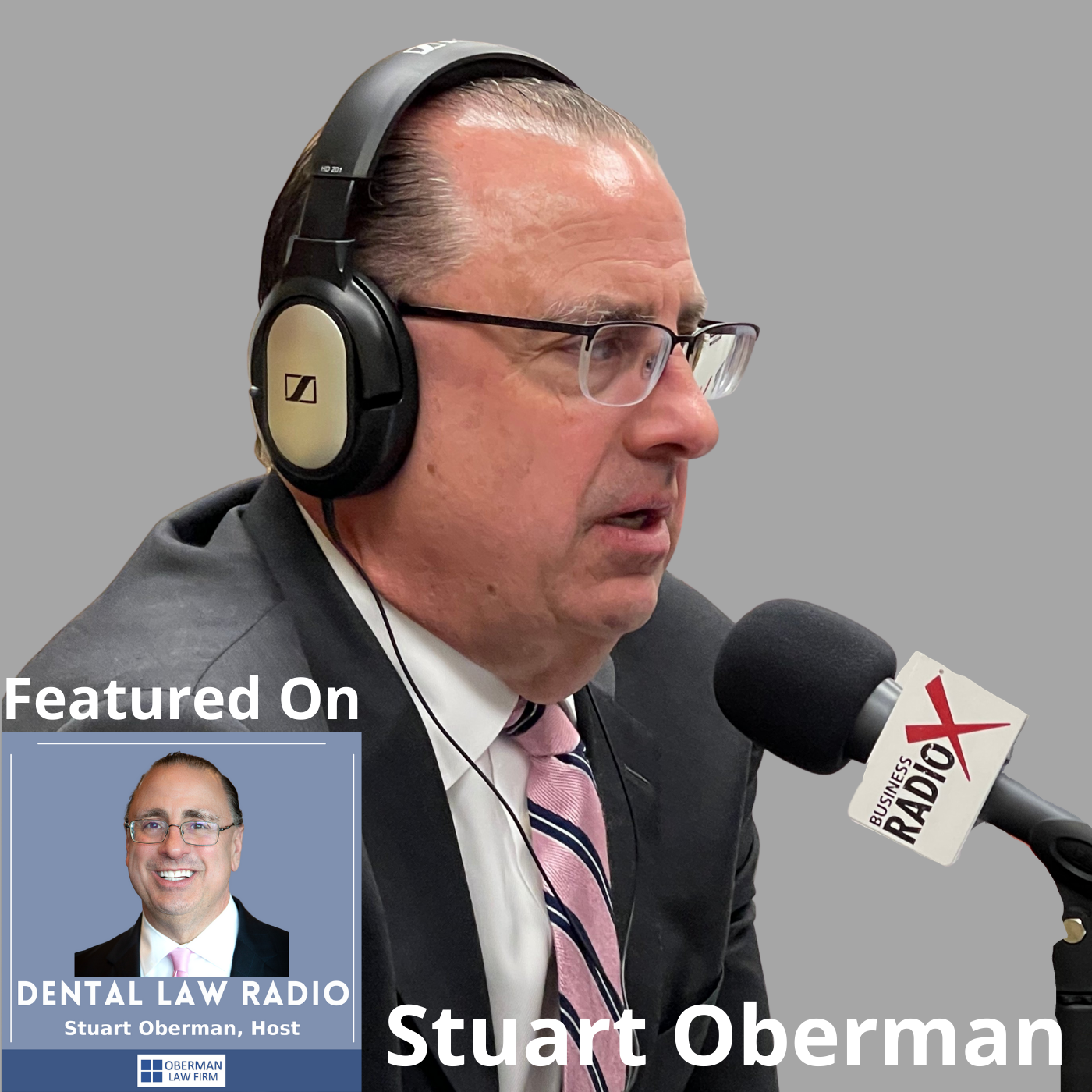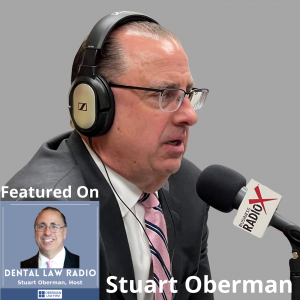
How to Mitigate the Risk of Lawsuits (Dental Law Radio, Episode 4)
Host Stuart Oberman covers the basic internal procedures necessary to mitigate the risk of lawsuits in a dental practice. Dental Law Radio is underwritten and presented by Oberman Law Firm and produced by the North Fulton studio of Business RadioX®.
TRANSCRIPT
Intro: [00:00:02] Broadcasting from the Business RadioX Studios in Atlanta, it’s time for Dental Law Radio. Dental Law Radio is brought to you by Oberman Law Firm, a leading dental-centric law firm serving dental clients on a local, regional, and national basis. Now, here’s your host, Stuart Oberman.
Stuart Oberman: [00:00:27] Hello everyone and welcome to Dental Law Radio. So, today, is going to be an interesting topic. So, as a law firm in the dental space, if you will, we have clients in about 28 states, all the way from California, Maine to Florida, and we get this question over and over and over again. How do I mitigate my risks of lawsuits?
Stuart Oberman: [00:00:55] That’s a wide topic. You got all kinds of issues to look at. You’ve got State Department of Labor, you’ve got Federal Department of Labor, you’ve got IRS, you’ve got EEOC. You have lawyers breathing down your neck for certain regulatory matters because employees’ rights have been violated. So, you know, what is the risks of a lawsuit?
Stuart Oberman: [00:01:25] And I would say it’s probably a failure to have internal proper procedures in place. What does that mean? On a 10,000 foot view, do I have an employee manual? Do I have nondisclosure agreements? Do I have cell phone, internet, policies, social media policies? Am I in compliance with the National Labor Relations Board? Am I in compliance with my State and Federal law? There’s really a couple things that you really need to have. And we’re going to talk about this on subsequent podcasts, but I want to maybe drill down on some specifics regarding employee manual because these are critical.
Stuart Oberman: [00:02:14] Every practice should have an employee manual. “Well, I’ve got one, you know, John gave it to me when I bought his practice. And, yeah, it’s not bad. You know, it’s 29 pages. It’s a little old. But I wrote on it. And I think we got employees sign over good.” Or, “You know, I went on the internet and I bought one.” Great. Great. Well, how’s that working out for you?
Stuart Oberman: [00:02:43] So, if you have an employee manual that you’ve got from someone, trash it. If you bought a practice and you implemented the employee manual that you now scratch outs or had on a Word document that is 15 years old and you decided to put different names on it, scrap it, shred it, it’s garbage. You’re going to need an up to date employee manual that has a couple of things. If your employee manual in today’s world is less than 70, 80, 90 – I think our employee manual that we draft for dental doctors on dental sides is, probably, 100 some pages – job descriptions, acknowledgments, nondisclosure agreements, all that’s got to be included. Social media, cell phone, internet policies got to be included.
Stuart Oberman: [00:03:31] So, what are some of the things that we see really need to be within these employee manuals? Again, we’re just touching on some stuff. So, one of the things that in today’s world, in today’s media world, in today’s society, you have to have non-harassment provisions. There’s no question about it. If you do not have provisions regarding harassment, regarding sex, color, creed, origin, nationality, then you are opening yourself up to a huge, huge problem. Anti-discrimination statute language should be included in your employee manual. Again, these are basics in a world within which we live. Anti-retaliation, a previous podcast we talked about OSHA, HIPAA, whistleblower. What to do if you’re fired?
Stuart Oberman: [00:04:31] In your employee manual, do you have a process for probation? Do you have a process for reporting complaints? Do you have someone in your practice – I don’t care how big you are – that is a go-to person for complaints. If you’re a doctor, chances are they’re not going to want to report to you directly regarding any kind of internal issues. You need to have a point person designated in your practice that has the authority to take down the investigation. Do you have an anonymous reporting process? And, again, I don’t care whether you’re a 20 practice owner or one practice owner.
Stuart Oberman: [00:05:16] Next one, Family Medical Leave Act. How many employees do you have? Does it even apply? There are some instances that you will say I do not need a Family Medical Leave Act. And you have to sign a document to the government that says that you do not comply or do not have to comply with the Family Medical Leave Act, because they just don’t believe you. The Emergency Paid Sick Leave Act. The Emergency Family Act. Especially in today’s world under COVID, a Medical Leave Expansion Act under FFCRA if you’re under 500 employees.
Stuart Oberman: [00:05:58] I could probably talk about this topic for about three hours on this one particular area, what it takes to have an employee manual. But you’ve got to be very careful on this area. So, the next question is, “Well, you know, I got a manual and a company gave it to me and it’s five volumes.” I’m going to be really honest with you, if you can comply with a five volume employee manual, I need to come work for you. Because I have never seen that before. And we’ll look at manuals and it will be three, four, five volumes of employee manual. How in the world can you be in compliance on that side?
Stuart Oberman: [00:06:42] It’s very basic things that will keep you out of trouble. If you’re required under your massive war and peace novel of employee manuals, there’s no way. You got too much liability, you got too many holes that it is impossible for you to comply with. Keep it short. Keep it simple. Basic stuff. Basic information. And that is probably one of the biggest ways that will keep you out of the EEOC, Department of Labor, National Labor Relations Board, governmental investigations.
Stuart Oberman: [00:07:25] So, again, it’s the basic stuff. A lot of times our doctors will get way, way complex. They don’t need it. They’re being sold stuff they don’t need, which happens a lot. So, we need to be real careful with that. So, it’s the little things that will keep you out of trouble. It’s not, you know, recreating the world, but it’s simply one wheel at a time to get you there. So, again, that’s 10,000 foot view.
Stuart Oberman: [00:07:52] We see a lot on our side. We handle as a firm a lot of H.R. issues. We see what works. We see what doesn’t. It’s a moving target between state to state. It’s a moving target between employee to employee. And it’s a moving target in today’s regulatory matters. So, hopefully, you’ve taken away, you know, one thing that you need to look at to avoid H.R. issues, to avoid any kind of compliance issues, which is understanding basic employee manual, why you need it, why you don’t. We talked about HIPAA and OSHA before, so this is all part of that particular puzzle. So, again, quick topic today, just enough to give you a 10,000 foot view, as we say.
Stuart Oberman: [00:08:37] So, I want to thank everyone for joining us today on Dental Law Radio. If you have any questions, if you have any concerns, reach out to us. Give us a call, 770-554-1400. Or send an email, stuart, S-T-U-A-R-T, @obermanlaw.com. And we hope that you will join us on subsequent podcasts. And our goal is to keep you up to date in the industry, leading edge, cutting edge information. So, thank you everyone. Have a fantastic day. And we look forward to talking to you soon. Thank you.
About Dental Law Radio
Hosted by Stuart Oberman, a nationally recognized authority in dental law, Dental Law Radio covers legal, business, and other operating issues and topics of vital concern to dentists and dental practice owners. The show is produced by the North Fulton studio of Business RadioX® and can be found on all the major podcast apps. The complete show archive is here.
Stuart Oberman, Oberman Law Firm

Stuart Oberman is the founder and President of Oberman Law Firm. Mr. Oberman graduated from Urbana University and received his law degree from John Marshall Law School. Mr. Oberman has been practicing law for over 25 years, and before going into private practice, Mr. Oberman was in-house counsel for a Fortune 500 Company. Mr. Oberman is widely regarded as the go-to attorney in the area of Dental Law, which includes DSO formation, corporate business structures, mergers and acquisitions, regulatory compliance, advertising regulations, HIPAA, Compliance, and employment law regulations that affect dental practices.
In addition, Mr. Oberman’s expertise in the health care industry includes advising clients in the complex regulatory landscape as it relates to telehealth and telemedicine, including compliance of corporate structures, third-party reimbursement, contract negotiations, technology, health care fraud and abuse law (Anti-Kickback Statute and the State Law), professional liability risk management, federal and state regulations.
As the long-term care industry evolves, Mr. Oberman has the knowledge and experience to guide clients in the long-term care sector with respect to corporate and regulatory matters, assisted living facilities, continuing care retirement communities (CCRCs). In addition, Mr. Oberman’s practice also focuses on health care facility acquisitions and other changes of ownership, as well as related licensure and Medicare/Medicaid certification matters, CCRC registrations, long-term care/skilled nursing facility management, operating agreements, assisted living licensure matters, and health care joint ventures.
In addition to his expertise in the health care industry, Mr. Oberman has a nationwide practice that focuses on all facets of contractual disputes, including corporate governance, fiduciary duty, trade secrets, unfair competition, covenants not to compete, trademark and copyright infringement, fraud, and deceptive trade practices, and other business-related matters. Mr. Oberman also represents clients throughout the United States in a wide range of practice areas, including mergers & acquisitions, partnership agreements, commercial real estate, entity formation, employment law, commercial leasing, intellectual property, and HIPAA/OSHA compliance.
Mr. Oberman is a national lecturer and has published articles in the U.S. and Canada.
Oberman Law Firm
Oberman Law Firm has a long history of civic service, noted national, regional, and local clients, and stands among the Southeast’s eminent and fast-growing full-service law firms. Oberman Law Firm’s areas of practice include Business Planning, Commercial & Technology Transactions, Corporate, Employment & Labor, Estate Planning, Health Care, Intellectual Property, Litigation, Privacy & Data Security, and Real Estate.
By meeting their client’s goals and becoming a trusted partner and advocate for our clients, their attorneys are recognized as legal go-getters who provide value-added service. Their attorneys understand that in a rapidly changing legal market, clients have new expectations, constantly evolving choices, and operate in an environment of heightened reputational and commercial risk.
Oberman Law Firm’s strength is its ability to solve complex legal problems by collaborating across borders and practice areas.
Connect with Oberman Law Firm:
Company website | LinkedIn | Twitter
















